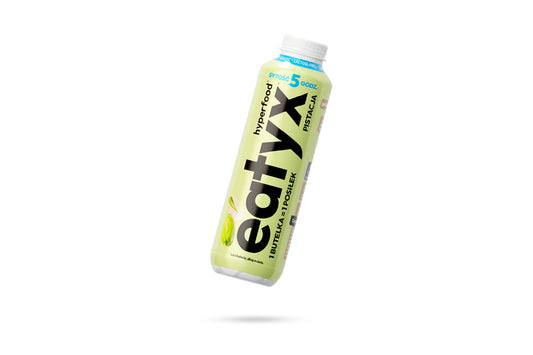Nowadays, we come across meat substitutes at every step (especially in the supermarket). This is especially visible in the case of milk, or rather plant drinks, of which we currently offer at least several different types. From the article you will learn about the most common ones found in popular discount stores and whether any of the types are particularly beneficial for health.
Plant drink
In 2021, the Kukuła Healthy Food report was published, which noted that 16% of Poles declare that they follow the principles of a plant-based diet, with 10% of them following a vegetarian diet and 6% a vegan diet . In office practice, there is also a trend in which more and more people tend to follow the principles of a plant-based diet and ask for such menus. All this means that the demand for products of plant origin is constantly growing, and the range of products is expanding at an alarming rate. An excellent example of this are plant drinks, which in many stores already have their own, separate (and often large) shelf, on which they eagerly stand and are often (especially during promotions) bought out to the last carton in the blink of an eye.
And it's generally good that people are starting to choose plant-based products more and more often. The evidence clearly shows a number of benefits from implementing such an intervention. Plant-based diets have a beneficial effect on body weight and reduce the risk of cancer development by 16% and death by 13% [1]. What is particularly visible in scientific research is the beneficial effect of a vegan/vegetarian diet on the health of the cardiovascular system - this is extremely important, because heart diseases remain the leading cause of death around the world [2]. As a rule, there are even more benefits and they could go on and on... Importantly, the benefits are already observed from introducing at least one plant-based meal at the expense of meat, so you don't have to turn your diet upside down.

PS. Out of dietary obligation, I have to add this because I notice a disturbing trend. Plant-based diets are widely promoted as very healthy, but we must remember that the principle remains the same as for "omnivores" - you can balance your diet very well or simply poorly. This means that a plant-based diet based on whole grains, nuts, olive oil, avocados, fruits and vegetables can provide you with a number of benefits , but a plant-based diet consisting of refined grains, products with added sugar and a small amount of vegetables and fruits will not fulfill its purpose. functions . If you want to switch to a plant-based diet, remember that a plant-based diet is not the same as a plant-based diet .
And if you are looking for plant products that are enriched with vitamins and minerals, be sure to check out the eatyx offer. You will find there, for example:
plant-based drinks
Let's move on to the culprits of today's confusion, i.e. plant drinks. I would like to point out that in the article I will use the terms "beverage" and "milk" interchangeably, because that is how they commonly say it. However, according to European Union law, the name "milk" is reserved only for dairy products of animal origin . Therefore, being fully politically correct - the correct name is only the one containing the word "drink".
Before I discuss specific examples for you, I will tell you at the beginning the most important rule that is worth following when choosing a specific plant drink. Let's take a closer look at the following two important aspects.
-
When choosing a plant-based drink, we give up cow's milk, which is a source of…
-
When choosing a plant-based drink, we most likely base our diet on this type of products, so we are exposed to deficiency...
The answer to the first sentence is " calcium ", to the second " among others, vitamin B12 ". Why am I talking about this? Because for many Poles, cow's milk is one of the most important sources of calcium in the diet, and a significant threat resulting from the use of plant-based diets is providing too little vitamin B12. So what to do? If you follow a plant-based diet (or animal products appear very rarely), choose plant-based drinks fortified with vitamin B12 and calcium - this is very important !
It is worth making sure that plant milk does not have added sugar, because it is unnecessary in this product and as long as you consume 100-200 ml of coffee a day, trace amounts of sugar will probably not cause any major harm, but it is still a completely unnecessary addition.
PS. Sometimes it is worth (especially on a vegan diet) looking for iodine fortifications. A significant number of vegans are iodine deficient and we should also remember this connection.

types of plant milks
The most popular types of plant-based milks are :
-
oat "milk",
-
"Almond milk,
-
soy "milk",
-
"coconut milk,
-
rice "milk".
Other plant milks are also available. The types mentioned above are most often found in popular supermarkets. But anyway, you now know what types of plant milk we can find. Now let's analyze which of them seems to be the best choice in terms of health.
oat milk
An oat drink usually consists of about 10-15% oats and water, emulsifiers, salt and possibly added vitamins or minerals. What is particularly important for health is the fact that oats are a source of health-beneficial beta-glucans, which have a positive effect, for example, on LDL cholesterol [3]. Of course, consuming a sufficient amount of them may be quite difficult from oat drink alone, but we can treat it as a beneficial addition to the diet and if we eat oatmeal for breakfast (the flakes are a good source of beta-glucans), an additional 100-200 ml of oat drink can bring additional health benefits.
Almond milk
Almond drink usually contains about 2-4% almonds as well as water, additives and possibly vitamins and minerals. Analyzing almonds themselves, they are a source of beneficial mono- and polyunsaturated fatty acids, magnesium, iron, phytosterols, flavonoids , as well as many other bioactive compounds with health-promoting potential [4]. However, their impact on health is usually examined with an average consumption of 30-50 g/day, which is difficult to achieve when drinking almond drink. In practice, it may be a beneficial addition to your diet, but I still suggest adding a handful of nuts a day and treating the drink as a tasty addition.
coconut milk
As for the coconut drink, it consists of coconut pulp (8-10%) and water, additives and possibly vitamins and minerals. In this case, it is worth pointing out that coconut is a source of fats, including saturated fatty acids, which, according to the guidelines, should be limited to the necessary minimum . And in a situation where we use coconut drink occasionally for specific recipes, there is no problem, but when you consume it in large quantities every day, it does not seem to be the best solution. Our diet should be based on mono- and polyunsaturated fatty acids, and coconut drink will not provide us with this. The properties and effects of individual fatty acids are very important for our health.
soy milk
A soy drink consists of approximately 6% soybeans and water, necessary additives, and possibly vitamins and minerals. It has slightly more protein than other products in this category , but most importantly - it contains up to 60 mg of soy isoflavones per glass . Scientific data indicate that the consumption of soy isoflavones is associated with a lower risk of developing cancer, heart disease and gynecological and metabolic diseases, especially in perimenopausal women [5].
Although many people are afraid of soy products, their regular consumption in moderate amounts is actually beneficial to health and provides many benefits! In my opinion, soy drink is definitely the best choice ! The properties of isoflavones are truly noteworthy, I highly recommend them!
rice drink
Rice milk/rice drink is a product without much history. It consists of 12-17% rice and water, necessary additives, and possibly vitamins and minerals. Rice itself is rather neutral for our health and the same can be said about the drink. If you value it for its taste, then in moderate amounts, but in terms of health, each of its predecessors (apart from the coconut drink) is better.
Summary
To sum up, the market is definitely meeting customer expectations and introducing more and more products, including various types of plant drinks. Remember that we look at the diet as a whole, not on the basis of individual products, so there is little point in categorizing a drink as "beneficial" or "unfavorable". Treat a plant-based drink as a pleasant addition to your diet, but don't expect it to change your life/health. If each of the drinks is at a similar level in terms of taste, choose the soy one - it is the healthiest option, I would put the oat one in second place, and the almond one in third place (this is my subjective ranking) .

Literature:
- Selinger E, Neuenschwander M, Koller A, Gojda J, Kühn T, Schwingshackl L, Barbaresko J, Schlesinger S. Evidence of a vegan diet for health benefits and risks - an umbrella review of meta-analyses of observational and clinical studies. Crit Rev Food Sci Nutr. 2023;63(29):9926-9936. doi: 10.1080/10408398.2022.2075311. Epub 2022 May 16. PMID: 37962057.
- Salehin S, Rasmussen P, Mai S, Mushtaq M, Agarwal M, Hasan SM, Salehin S, Raja M, Gilani S, Khalife WI. Plant Based Diet and Its Effect on Cardiovascular Disease. Int J Environ Res Public Health. 2023 Feb 14;20(4):3337. doi: 10.3390/ijerph20043337. PMID: 36834032; PMCID: PMC9963093.
- Othman RA, Moghadasian MH, Jones PJ. Cholesterol-lowering effects of oat β -glucan. Nutr Rev. 2011 Jun;69(6):299-309. doi: 10.1111/j.1753-4887.2011.00401.x. PMID: 21631511.
- Dreher ML. A Comprehensive Review of Almond Clinical Trials on Weight Measures, Metabolic Health Biomarkers and Outcomes, and the Gut Microbiota. Nutrients. 2021 Jun 8;13(6):1968. doi: 10.3390/nu13061968. PMID: 34201139; PMCID: PMC8229803.
- Li N, Wu X, Zhuang W, Xia L, Chen Y, Zhao R, Yi M, Wan Q, Du L, Zhou Y. Soy and Isoflavone Consumption and Multiple Health Outcomes: Umbrella Review of Systematic Reviews and Meta-Analysis of Observational Studies and Randomized Trials in Humans. Mol Nutr Food Res. 2020 Feb;64(4):e1900751. doi: 10.1002/mnfr.201900751. Epub 2019 Oct 14. PMID: 31584249.



